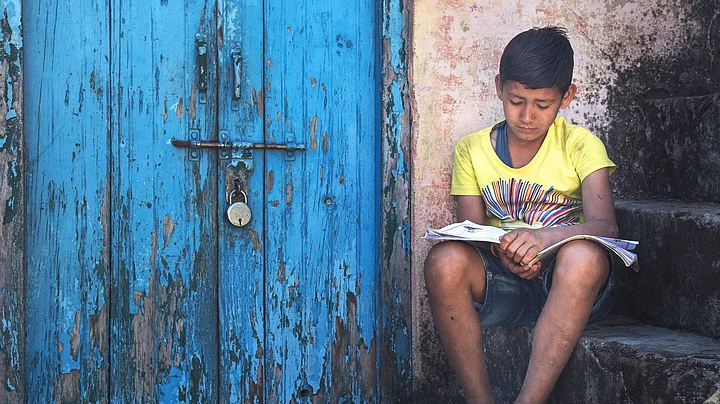Over 80 percent children enrolled in government schools did not receive any form of education since the lockdown period, while only 20 percent teachers of government schools were trained for delivering classes online, reveals a survey conducted by Oxfam India across five Indian states.
Titled Status Report – Government and Private Schools During COVID-19, the study survey is based on responses of 1,158 parents across private and government schools in Bihar, Chhattisgarh, Jharkhand, Odisha and Uttar Pradesh. It also incorporates the responses of over 488 government school teachers based on interviews conducted between May to June 2020.
According to the study, every eight out of 10 parents reported that no education was provided to their children enrolled in government schools during the lockdown period. In Bihar, 100 percent children did not receive any education during the same period.
Moreover, despite the Supreme Court’s order asking states to ensure the supply of midday meals to students of shut schools, only 65 percent students in all five states received meals, with over 92 percent children in UP saying that they were deprived of the same.
No Online Training for 80% Govt School Teachers
In addition, over 75 percent parents of children enrolled in government schools said the absence of internet connectivity, inability to afford data connections and slow internet speed had created hurdles in online learning.
In Jharkhand, over 40 percent parents said that they did not have the right device to access online education for their children.
Of the 20 percent government school students who received education during lockdown, around 75 percent remained dependent on WhatsApp, followed by around 38 percent who remained dependent on telephone calls with teachers for continued education.
Further, the survey points out that two out of every five government school teachers did not have the devices required to deliver education online, with the percentage of such teachers being as high as 80 percent and 67 percent in Uttar Pradesh and Jharkhand respectively.
What’s even more shocking is that around 80 percent teachers in these five states had received no orientation training for conducting online classes, with Bihar leading the chart where only 5 percent teachers received training for delivering digital education.
Around 80 percent children in government schools across these five states have not received textbooks for the next academic year, which means eight out of ten students have been left to study without any reading material whatsoever.
In Private Schools, 39% Paid Hiked Fees
While parents of students enrolled in government schools complained about the various hindrances to online education, for those sending their kids to private schools, school fees remain a major source of economic stress.
According to the survey, around 39 percent parents in Bihar, Chhattisgarh, Jharkhand, Odisha and Uttar Pradesh Pradesh had to pay hiked fees for the upcoming academic year.
In Uttar Pradesh where the state government had asked parents not to hike fees, around 50 percent parents reported having paid hiked fees.
In Odisha, which had issued no clear instruction on school fees, around 50 percent parents had to pay for uniforms, despite massive resistance. In private schools too, 80 percent parents said they faced challenges in online education, with 23 and 18 percent saying that didn’t have any device and internet connection respectively.
- Signal/internet speed issues- 53%
- Data is too expensive- 32%
- Don’t have device-23%
- Difficulty in negotiating software- 19%
- No internet connection- 18%
The Ten Recommendations
- Issue a notification under the provisions of Section 10 (2) (1) of the Disaster Management Act, putting in place a moratorium on private schools hiking fees until normalcy is restored
- Improve enforcement of state orders around fee hikes; set up a helpline for parents to report grievances and ensure that they are responded to within 48 hours
- Use inclusive means such as including a few pages of printed material of daily exercise for children along with the MDM and ICDS rations being distributed
- Ensure home delivery of textbooks to all children in government schools to enable them to return to the realm of learning
- Facilitate physical classes to support a gradual transition to the reopening of schools by issuing instructions to begin Mohalla classes (while maintaining physical distancing), in areas with low infection rates Page 4
- Ensure safety, home delivery of cooked meals/dry rations under the midday meal scheme; ensure access is unconditional (without documentation such as Aadhaar)
- Disinfect schools thoroughly and develop a participative process involving parents, local health administration and teachers to certify schools as safe to open
- Instruct states to recover lost instructional time by designing and delivering a 45-day accelerated learning curriculum (focused on foundational skills) that supports a smooth transition for students back to school
- Mobilise Panchayat Samitis to map at-risk and vulnerable children (particularly girls and migrant children), and connect them to relevant social protection schemes
- Don’t task teachers with non-teaching field-duties that have safety and health hazards; in the case that such tasks are allocated, ensure that they receive PPE, additional hazard pay and insurance
